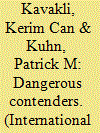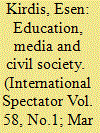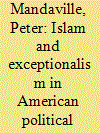| Srl | Item |
| 1 |
ID:
171169


|
|
|
|
|
| Summary/Abstract |
How do international observers decide whether to criticize or condone electoral fraud in a country? We argue that this decision depends on the identity of the victims of electoral fraud. A monitoring organization is more likely to overlook fraud committed against groups that are deemed dangerous by its sponsor. Based on this insight, we hypothesize that in the post-Cold War era election monitors are more tolerant of fraud against Islamic challengers, especially when Islamic movements are perceived as a threat to political stability. In support of our hypothesis, we find that outside monitors are more likely to endorse an election in countries with an Islamic opposition party and an ongoing Islamist terrorist campaign. Furthermore, we find that the effect is driven by Western monitoring organizations and becomes stronger after the September 11 attacks. Our findings provide a simple yet powerful insight: the calculus of outside observers depends not only on who they wish to see in power, but also who they want to keep from power.
|
|
|
|
|
|
|
|
|
|
|
|
|
|
|
|
| 2 |
ID:
191022


|
|
|
|
|
| Summary/Abstract |
The Turkish economy is in freefall with rising inflation, unemployment, poverty and income inequality. Yet, the incumbent Justice and Development Party (JDP) continues to get the support of roughly one-third of the voters according to the latest surveys. Although this is a long way from the peak of the party when it was getting half the overall votes a decade ago, it is nevertheless a significant proportion of the voter base. What explains such a vote? More generally, why do people vote against their own material interests? Looking at the JDP’s twenty-year incumbency, it can be argued that the JDP created party identification amongst a particular set of Turkish voters by utilising religious institutions, the education system, the media and civil society to construct its cultural hegemony.
|
|
|
|
|
|
|
|
|
|
|
|
|
|
|
|
| 3 |
ID:
121616


|
|
|
|
|
| Publication |
2013.
|
| Summary/Abstract |
The phenomenal success achieved by Islamic political parties in the wake of the Arab uprisings of 2011 is one of the most significant and frequently noted developments to follow from those momentous events. Within a few months of the demise of long-standing authoritarian regimes, Islamist groups that had been banned and oppressed for decades found themselves flourishing. Soon El-Nahda in Tunisia and then Egypt's Muslim Brotherhood tasted victory in constituent assembly, legislative, and eventually presidential elections. A new area of political Islam in power had seemingly arrived.
|
|
|
|
|
|
|
|
|
|
|
|
|
|
|
|